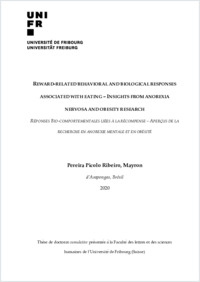Reward-related behavioral and biological responses associated with eating : insights from anorexia nervosa and obesity research
- Pereira Picolo Ribeiro, Mayron
- Martin Soelch, Chantal (Degree supervisor)
-
2020
1 ressource en ligne (253 p.)
Thèse de doctorat: Université de Fribourg, 2020
Troubles du comportement alimentaire
Anorexie mentale
Obésité
Récompense (psychologie)
Système de récompense cérébrale -- fre
Femmes
English
Research on clinical populations with eating disturbances has shown the involvement of reward processing in the maintenance of disease- associated symptoms. Investigation on food as a reward indicates the metabolic or feeding state (i.e. fasted or fed state) as a modulator of food as a reward, but little is known about how these states influence other types of reward. This is important because responses to rewards other than food are also altered in several disorders, including those involving eating disturbances. Therefore, the aim of this dissertation was to investigate behavioral and biological responses to monetary reward during fasting and fed states in healthy women, women with anorexia nervosa and women with obesity. For the behavioral responses, we used an experimental gambling task, the wheel of fortune, to evaluate responses to winning or losing a monetary reward involving different probabilities. The patients with anorexia nervosa (AN) repeated the same procedures after weightrestoration treatment. This procedure resulted in empirical studies 1 and 2. The biological responses consisted of circulating levels of endoncannabinoids (eCB) in the participants, and investigation of the correlation between eCB and the responses to reward were reported in empirical study 3. In summary, our results show higher positive mood to winning monetary rewards during fasting for normal- weight women, but not women with anorexia nervosa and more negative mood to not winning during the fed state in normal-weight women and women with AN. No difference regarding mood between feeding states was observed for women with obesity. Regarding affect before and after the task, independently of the feeding state, women with AN and women with obesity reported more negative affect than normalweight women, with positive affect improving in normal-weight women and women with AN after the task, but not in women with obesity. Patients with AN’s mood reactivity to losing monetary rewards was blunted in comparison to normal- weight controls. Patients with obesity also showed blunted activity to losing low- risk monetary rewards, but also showed less mood reactivity to winning high-risk rewards than controls. Reaction times to categories that involved equal chance (50% of chance of either option) in AN were longer than controls and other categories. With regards to the biological responses, no significant correlations were found between eCB and behavioral responses to monetary rewards. Anandamide, and eCB, was found to be significantly lower during fasting in comparison to the fed state. In patients with AN, levels of anandamide were significantly lower than in healthy controls and remained unchanged following weight-restoration treatment. These results indicate that some types of responses to monetary rewards can be modulated by the feeding state. The applicability of the results is discussed.
- Faculty
- Faculté des lettres et des sciences humaines
- Language
-
- English
- Classification
- Psychology
- Notes
-
- Texte en anglais seulement
- License
-
License undefined
- Identifiers
-
- RERO DOC 328577
- RERO R009053306
- URN urn:nbn:ch:rero-002-120667
- Persistent URL
- https://folia.unifr.ch/unifr/documents/308689
Statistics
Document views: 631
File downloads:
- Texte intégral: 576
